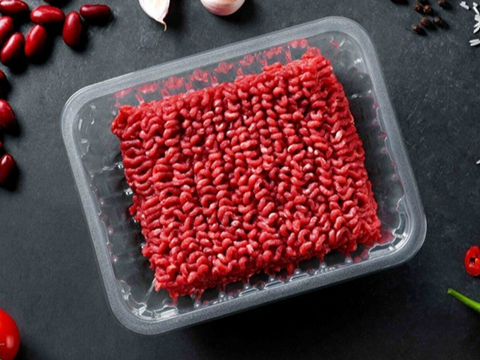
Tesco and Hilton Foods will package the retailer’s own-brand minced beef product in Klöckner Pentaplast (kp)’s ‘first-ever’ 100% rPET food trays made from recovered tray material, hoping to help unlock full circularity for food packaging.
Back in April 2024, kp revealed what it claimed to be the first food packaging tray composed entirely of recycled tray material. This was achieved through the Tray2Tray closed-loop initiative, in which used food trays are recovered and recycled back into food trays; kp aims to source at least 30% of its recycled material from Tray2Tray by the end of 2025.
Now it is working with Tesco and Hilton Foods to pilot such trays for the Tesco’s Finest minced beef product – sealing the tray with the kp FlexiLid barrier film, which contains 30% post-consumer recycled content.
Of an estimated one million tonnes of PET produced in the EU every year, only 5% is believed to be recycled back into food-grade trays; kp hopes that Tray2Tray will create a dedicated supply stream of recycled PET from trays and raise the percentage.
“While this is a pilot, it’s clearly a massive step forward for the packaging circular economy,” said Rebecca Harris, global account director at kp. “We launched our kp Tray2Tray initiative because valuable food-safe tray material enters the recycling loop, but all too often the rPET material is downcycled to other product applications.
“Until something changes and demand is boosted, the required collection, sorting and recycling at scale will not be sufficient. So, what we’re doing here has real significance.
“The pilot is a dream match. At kp, we’re innovative designers of food packaging solutions driven by our ambitious Investing in Better sustainability strategy; Hilton Foods, focused on its Sustainable Protein Plan, creates and produces high-quality packaged food, and Tesco has built sustainability into its purpose, strategy and business plans.
“kp made a splash when we launched our first trays with 100% kp Tray2Tray rPET from trays in the UK, and this real-world trial is the perfect opportunity to show what our experienced technical team has accomplished.
“It’s not just about being first, it’s about setting a precedent. What we want to show in this proof-of-concept pilot is how our kp Tray2Tray made from 100% rPET tray flake is a perfect ‘drop-in’ solution for retailers and packers.
“Switching incumbent packaging to more sustainable alternatives should be simple, so we’re showcasing the ease of transition without compromise. And, by doing that, we’re offering a glimpse into the future of food tray packaging circularity.”
Andrea Jex, procurement director at Hilton Foods, continued: “This achievement exemplifies the power of collaboration with our customers and suppliers to deliver market-leading innovation to the shelves. Through these strong, long-standing partnerships, we remain dedicated to creating cutting-edge solutions that align with the goals of our Sustainable Protein Plan and our customers ambitions, whilst upholding the highest standards of quality and product shelf life for their consumers.”
“We are determined to close the loop on our packaging – for it to be fully recyclable and contain recycled content wherever possible,” added James Bull, head of Packaging and Food Waste at Tesco. “We remain committed to reducing our environmental impact, and helping our customers to do the same, as we work together to protect our planet.”
The news comes in the wake of various retailers taking steps to remove plastic trays from their minced meat products. Lidl’s vacuum-packed beef mince sought to reduce plastic consumption by 63% and save 250 tonnes every year, while Asda’s vacuum packaging for its own beef mince range was said to feature 60% less plastic and remove 60 tonnes from its operations every year.
However, such transitions proved controversial among consumers. Sainsbury’s planned to cut 55% of plastic per beef mince product with its own vacuum packs, yet shoppers described the new packaging as ‘awful’ due to the meat’s unpleasant appearance. They also complained about the additional effort required to recycle the plastic film in-store, whereas the previous trays had been home-recyclable.
In response to consumer complaints, Iceland Foods walked back on a previous switch to airtight vacuum packaging and reverted back to plastic trays for its beef and pork mince products.
If you liked this story, you might also enjoy:
The ultimate guide to the Packaging and Packaging Waste Regulation in 2024
How are the top brands progressing on packaging sustainability?
Sustainable Innovation Report 2024: Current trends and future priorities
Everything you need to know about global plastic sustainability regulation













No comments yet